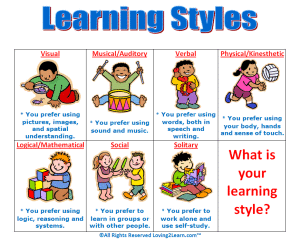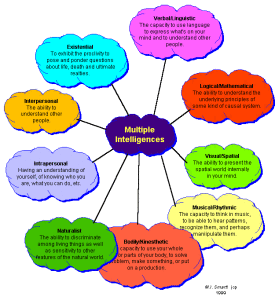Many people believe that people are either smart, or they’re not. If you’re not, then tough luck. You are not going to do very well in life.
But I don’t believe that. And I have read research that says people are smart in different ways. They call this multiple intelligences.
The reason I think it’s important for homeschool moms to know about and consider multiple intelligences is that it can be easy to get discouraged about your child and his ability or intelligence if you think traditional, academic skills are the only way to measure intelligence. If you take this approach, then you take pride in grades, academic progress, smartness, performance on standardized tests, etc. And if your child doesn’t do well on these things, you may tend to look at your child as “damaged goods”. This can lead to shame and disappointment on your part and the part of your child.
The type of intelligence that your child is strongest in (which may be more than one) will influence their learning style.
Here is a chart of learning styles which I included in a post about learning styles a while ago.
Photo credit Loving2learn.com
“An intelligence is the ability to solve problems, or to create products, that are valued within one or more cultural settings.”
– Howard Gardner, Frames of Mind (1983)
intelligence type capability and perception
Linguistic words and language
Logical-Mathematical logic and numbers
Musical music, sound, rhythm
Bodily-Kinesthetic body movement control
Spatial-Visual images and space
Interpersonal other people’s feelings
Intrapersonal self-awareness
To read more about multiple intelligences, go here.
For you visual people,
here’s a colorful chart!
One of the great things about homeschooling is that we can adjust the way we do things to match the needs of our individual children. We can adapt our teaching style to their learning style.
We may find that there is a big difference. The goal is for our child to learn so that is the thing we need to keep in mind when planning curriculum, or not to use curriculum, and how we should facilitate learning for our child.
My philosophy is “whatever it takes”. What works best for them.
I found this great blog post today that illustrates what I’m talking about. I think you will love this, so please click over and read this, but make sure you come back and finish this post here on my blog! 🙂
Another thing that I would like for new homeschool moms to consider is a notion called “readiness”.
Some children are early learners. Some are excited to learn how to read and can be taught when they are very young.
Others, like most of mine, take their sweet time, and are usually motivated to learn to read by the need to read the words in a game.
Some are very interested in numbers and love to work puzzles and solve problems and are quick to learn their addition and subtraction facts and multiplication tables.
Others, like most of mine, have to struggle to learn and memorize these facts.
My children are very intelligent, but they have been older when they have learned most of these basic skills. They have been way older than 5 or 6 years of age.
They are bright, and they are even doing well in academic skills now, but they did not learn them early or young. They learned them as they felt the need to learn them.
Some of them still need a little extra time to think about the multiplication facts. But they are functioning very well at the jobs they do and in life in general.
Children do not need to learn certain skills by a certain time to be able to do well in life. There is no window of time where things need to be learned or they will never learn them. There is some truth to the idea that young children can memorize more easily. But some people are never good at memorizing, no matter what their age.
So the thing I would say to young parents is: don’t stress about your child not learning new skills when others their age are. If you present it to your child, and they are not ready to learn it yet, then back off from that, and work on something they ARE ready to learn.
I have given this advice to many parents, and it has liberated them from unreasonable expectations and causing feelings of failure in their children. Children need support as they are learning new skills, not harshness or pressure or discouragement.
If you want to get some perspective of what it is like learning all of the basic skills we are trying to teach our little ones, do a little experiment.
Write something with the opposite hand that you are used to writing with. Copy a memory verse or something with your left hand when you’re right-handed or vice versa. See how difficult it is!
Now apply that to how your child feels as he is learning to read, write, add, subtract, and all the other new skills he is expected to learn in his first years of school.
Now take these ideas into consideration as you are teaching your child at home.
Make learning as pleasant an experience as possible. Guard the relationship you have with your child by not getting stressed out, irritated, or frustrated by his inability to learn something you are trying to teach him.
And, please don’t put your child down or consider him substandard because he can’t learn it in the same manner that you learned it or at the age others are learning it.
Remember these things as you are teaching your precious little ones at home. You are Mommy. You are not Teacher. They want you to always be Mommy, so don’t turn into something else during “school” time.
Your children will thank you some day, and you will be thankful that they still want to be around you.










 "Oh that God would give every mother a vision of the glory and splendor of the work that is given to her when a babe is placed in her bosom to be nursed and trained! Could she have but one glimpse in to the future of that life as it reaches on into eternity; could she look into its soul to see its possibilities; could she be made to understand her own personal responsibility for the training of this child, for the development of its life, and for its destiny,--she would see that in all God's world there is no other work so noble and so worthy of her best powers, and she would commit to no other's hands the sacred and holy trust given to her." -JR Miller
"Oh that God would give every mother a vision of the glory and splendor of the work that is given to her when a babe is placed in her bosom to be nursed and trained! Could she have but one glimpse in to the future of that life as it reaches on into eternity; could she look into its soul to see its possibilities; could she be made to understand her own personal responsibility for the training of this child, for the development of its life, and for its destiny,--she would see that in all God's world there is no other work so noble and so worthy of her best powers, and she would commit to no other's hands the sacred and holy trust given to her." -JR Miller






